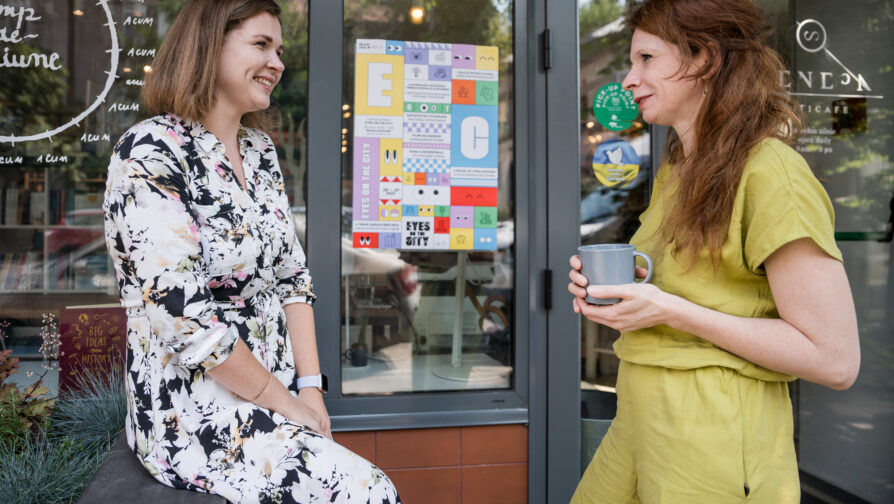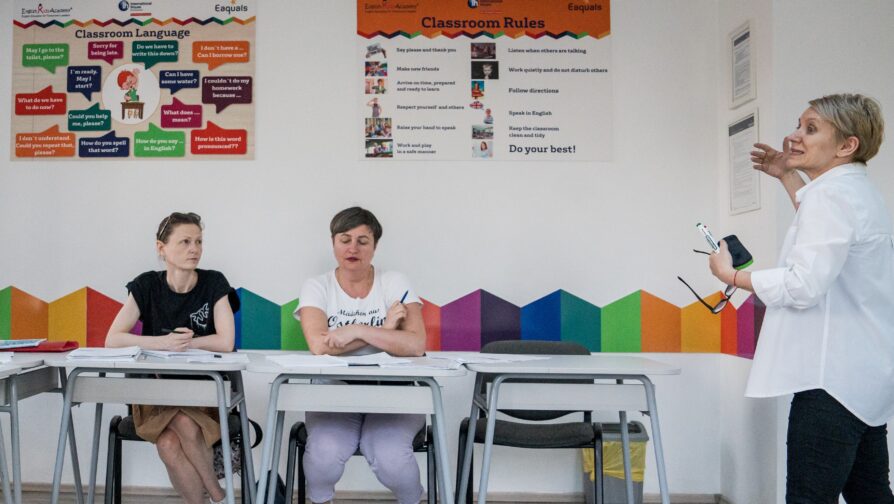How Romanians View Refugees
Romanians have shown unprecedented solidarity and support in response to the Ukraine situation.
The spirit of generosity and hospitality shown by Romanians to Ukrainian refugees during times of war and violence will be remembered in history.
Here we have two Romanians who employ and teach their language to refugees in Bucharest. They share their experiences and views about refugees.
Valentina Bacu
Manager, Seneca Anticafe

Katerina (L), a Ukrainian refugee and Valentina (R), Manager of Seneca Anticafe in Bucharest, Romania, June 2023 ©UNHCR
The idea of providing assistance to refugees came to Valentina on the day when an influx of refugees from Ukraine began to arrive in Romania. Like many of her friends, her first impulse was to go to the border or to the Gara de Nord railway station to help.
But Valentina became sick with Covid-19 the very day when she would have volunteered at one of the refugee support centres. During her two weeks of isolation she started to develop a more coherent project to support refugees from cultural institutions.
That is how Open Museums Open Hearts was born in 2022, a project dedicated to young people from Ukraine, which took place in four national museums in Bucharest. This project has also a close connection with the Seneca Anticafe bookstore she is managing.
“I had never worked with refugees before. In the first few months I found the experience emotionally overwhelming. The team at Seneca Anticafe became my support system, and this had an extremely strong impact on my life,” Valentina says.
The concept of recruiting new colleagues from Ukraine came naturally after interacting with them at Romanian language courses, integration workshops, and other events she has organized over the last year.
Ukrainian refugees had all the qualities she was looking for and overcame language and cultural barriers. Today, Valentina employs four refugees, and she is also involved in a community of over 400 Ukrainians participating in Romanian language courses and other cultural programmes dedicated to both Romanian and Ukrainian children and youth.
The war has no borders, she says, and would encourage other Romanians to engage in the integration process for refugees, to help them regain their confidence and become visible in the new socio-cultural space.
“Humanity is stronger than any weapon. We must stay positive and keep supporting those who need our help the most.”
Doinița Hornet
Language teacher, International House Bucharest

Doinita (R) teaching the Romanian language to Ukrainian refugees at the International House in Bucharest, Romania, June 2023 ©UNHCR
Doinita is a language instructor at the International House in Bucharest where she teaches the Romanian language. Her experience of teaching the language to Ukrainian refugees has been incredibly fulfilling. Witnessing her Ukrainian students’ determination to embrace a new language and culture has been inspiring for her.
Beyond teaching the language, she strives to create a welcoming environment, fostering friendships and solidarity with refugees, which ultimately promote inclusion. She says each day brings new milestones and connections, reaffirming the value of language education in building bridges between communities.
Her motivation to interact with refugees stems from a profound impression made by their plight through the Romanian and international media. Having a legal background also allows her to grasp their circumstances on a deeper level.
However, it was her role as an educator that instilled a strong sense of urgency to contribute and extend a helping hand, she says. Interacting with these students helped her to promote empathy and understanding, bridging the cultural divide.
“This experience reinforced the power of education in fostering social cohesion, and it reminded me of the value of extending compassion to those seeking a new beginning. It’s an honour to play a part in their journey towards a better future,” Doinita says.
Having personally witnessed their journey, she takes pride in Romania’s commitment to providing assistance through various programmes in collaboration with international and national organizations.
“Let’s continue to embrace empathy and solidarity, fostering a welcoming environment for refugees, so they can rebuild their lives with dignity and become valued contributors to society.”
The gratitude on her students’ faces serves as a powerful reminder of the significance of collective efforts in offering refuge and hope to those seeking a new home.
Edited by June Kim

